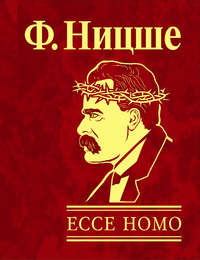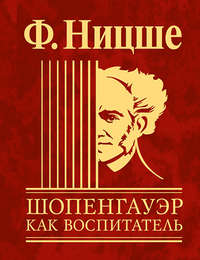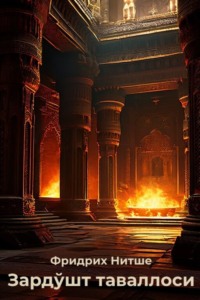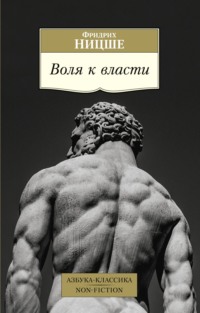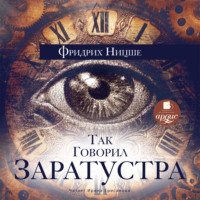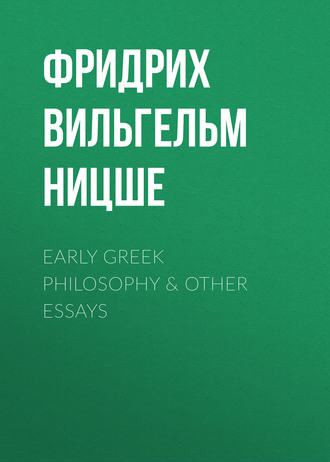 полная версия
полная версияEarly Greek Philosophy & Other Essays
Here now we may be met on the ground of a favourite æsthetic notion with the proposition, "It is not the poem which gives birth to the setting but the sentiment created by the poem." I do not agree with that; the more subtle or powerful stirring-up of that pleasure-and-displeasure-subsoil is in the realm of productive art the element which is inartistic in itself; indeed only its total exclusion makes the complete self-absorption and disinterested perception of the artist possible. Here perhaps one might retaliate that I myself just now predicated about the "Will," that in music "Will" came to an ever more adequate symbolic expression. My answer, condensed into an æsthetic axiom, is this: the Will is the object of music but not the origin of it, that is the Will in its very greatest universality, as the most original manifestation, under which is to be understood all Becoming. That, which we call feeling, is with regard to this Will already permeated and saturated with conscious and unconscious conceptions and is therefore no longer directly the object of music; it is unthinkable then that these feelings should be able to create music out of themselves. Take for instance the feelings of love, fear and hope: music can no longer do anything with them in a direct way, every one of them is already so filled with conceptions. On the contrary these feelings can serve to symbolise music, as the lyric poet does who translates for himself into the simile-world of feelings that conceptually and metaphorically unapproachable realm of the Will, the proper content and object of music. The lyric poet resembles all those hearers of music who are conscious of an effect of music on their emotions; the distant and removed power of music appeals, with them, to an intermediate realm which gives to them as it were a foretaste, a symbolic preliminary conception of music proper, it appeals to the intermediate realm of the emotions. One might be permitted to say about them, with respect to the Will, the only object of music, that they bear the same relation to this Will, as the analogous morning-dream, according to Schopenhauer's theory, bears to the dream proper. To all those, however, who are unable to get at music except with their emotions, is to be said, that they will ever remain in the entrance-hall, and will never have access to the sanctuary of music: which, as I said, emotion cannot show but only symbolise.
With regard however to the origin of music, I have already explained that that can never lie in the Will, but must rather rest in the lap of that force, which under the form of the "Will" creates out of itself a visionary world: the origin of music lies beyond all individuation, a proposition, which after our discussion on the Dionysean self-evident. At this point I take the liberty of setting forth again comprehensively side by side those decisive propositions which the antithesis of the Dionysean and Apollonian dealt with has compelled us to enunciate:
The "Will," as the most original manifestation, is the object of music: in this sense music can be called imitation of Nature, but of Nature in its most general form. —
The "Will" itself and the feelings – manifestations of the Will already permeated with conceptions – are wholly incapable of creating music out of themselves, just as on the other hand it is utterly denied to music to represent feelings, or to have feelings as its object, while Will is its only object. —
He who carries away feelings as effects of music has within them as it were a symbolic intermediate realm, which can give him a foretaste of music, but excludes him at the same time from her innermost sanctuaries. —
The lyric poet interprets music to himself through the symbolic world of emotions, whereas he himself, in the calm of the Apollonian contemplation, is exempted from those emotions. —
When, therefore, the musician writes a setting to a lyric poem he is moved as musician neither through the images nor through the emotional language in the text; but a musical inspiration coming from quite a different sphere chooses for itself that song-text as allegorical expression. There cannot therefore be any question as to a necessary relation between poem and music; for the two worlds brought here into connection are too strange to one another to enter into more than a superficial alliance; the song-text is just a symbol and stands to music in the same relation as the Egyptian hieroglyph of bravery did to the brave warrior himself. During the highest revelations of music we even feel involuntarily the crudeness of every figurative effort and of every emotion dragged in for purposes of analogy; for example, the last quartets of Beethoven quite put to shame all illustration and the entire realm of empiric reality. The symbol, in face of the god really revealing himself, has no longer any meaning; moreover it appears as an offensive superficiality.
One must not think any the worse of us for considering from this point of view one item so that we may speak about it without reserve, namely the last movement of Beethoven's Ninth Symphony, a movement which is unprecedented and unanalysable in its charms. To the dithyrambic world-redeeming exultation of this music Schiller's poem "To Joy," is wholly incongruous, yea, like cold moon-light, pales beside that sea of flame. Who would rob me of this sure feeling? Yea, who would be able to dispute that that feeling during the hearing of this music does not find expression in a scream only because we, wholly impotent through music for metaphor and word, already hear nothing at all from Schiller's poem. All that noble sublimity, yea the grandeur of Schiller's verses has, beside the truly naïve-innocent folk-melody of joy, a disturbing, troubling, even crude and offensive effect; only the ever fuller development of the choir's song and the masses of the orchestra preventing us from hearing them, keep from us that sensation of incongruity. What therefore shall we think of that awful æsthetic superstition that Beethoven himself made a solemn statement as to his belief in the limits of absolute music, in that fourth movement of the Ninth Symphony, yea that he as it were with it unlocked the portals of a new art, within which music had been enabled to represent even metaphor and idea and whereby music had been opened to the "conscious mind." And what does Beethoven himself tell us when he has choir-song introduced by a recitative? "Alas friends, let us intonate not these tones but more pleasing and joyous ones!" More pleasing and joyous ones! For that he needed the convincing tone of the human voice, for that he needed the music of innocence in the folk-song. Not the word, but the "more pleasing" sound, not the idea but the most heartfelt joyful tone was chosen by the sublime master in his longing for the most soul-thrilling ensemble of his orchestra. And how could one misunderstand him! Rather may the same be said of this movement as Richard Wagner says of the great "Missa Solemnis" which he calls "a pure symphonic work of the most genuine Beethoven-spirit" (Beethoven, p. 42). "The voices are treated here quite in the sense of human instruments, in which sense Schopenhauer quite rightly wanted these human voices to be considered; the text underlying them is understood by us in these great Church compositions, not in its conceptual meaning, but it serves in the sense of the musical work of art, merely as material for vocal music and does not stand to our musically determined sensation in a disturbing position simply because it does not incite in us any rational conceptions but, as its ecclesiastical character conditions too, only touches us with the impression of well-known symbolic creeds." Besides I do not doubt that Beethoven, had he written the Tenth Symphony – of which drafts are still extant – would have composed just the Tenth Symphony.
Let us now approach, after these preparations, the discussion of the opera, so as to be able to proceed afterwards from the opera to its counterpart in the Greek tragedy. What we had to observe in the last movement of the Ninth, i. e., on the highest level of modern music-development, viz., that the word-content goes down unheard in the general sea of sound, is nothing isolated and peculiar, but the general and eternally valid norm in the vocal music of all times, the norm which alone is adequate to the origin of lyric song. The man in a state of Dionysean excitement has a listener just as little as the orgiastic crowd, a listener to whom he might have something to communicate, a listener as the epic narrator and generally speaking the Apollonian artist, to be sure, presupposes. It is rather in the nature of the Dionysean art, that it has no consideration for the listener: the inspired servant of Dionysos is, as I said in a former place, understood only by his compeers. But if we now imagine a listener at those endemic outbursts of Dionysean excitement then we shall have to prophesy for him a fate similar to that which Pentheus the discovered eavesdropper suffered, namely, to be torn to pieces by the Mænads. The lyric musician sings "as the bird sings,"1 alone, out of innermost compulsion; when the listener comes to him with a demand he must become dumb. Therefore it would be altogether unnatural to ask from the lyric musician that one should also understand the text-words of his song, unnatural because here a demand is made by the listener, who has no right at all during the lyric outburst to claim anything. Now with the poetry of the great ancient lyric poets in your hand, put the question honestly to yourself whether they can have even thought of making themselves clear to the mass of the people standing around and listening, clear with their world of metaphors and thoughts; answer this serious question with a look at Pindar and the Æschylian choir songs. These most daring and obscure intricacies of thought, this whirl of metaphors, ever impetuously reproducing itself, this oracular tone of the whole, which we, without the diversion of music and orchestration, so often cannot penetrate even with the closest attention – was this whole world of miracles transparent as glass to the Greek crowd, yea, a metaphorical-conceptual interpretation of music? And with such mysteries of thought as are to be found in Pindar do you think the wonderful poet could have wished to elucidate the music already strikingly distinct? Should we here not be forced to an insight into the very nature of the lyricist – the artistic man, who to himself must interpret music through the symbolism of metaphors and emotions, but who has nothing to communicate to the listener; an artist who, in complete aloofness, even forgets those who stand eagerly listening near him. And as the lyricist his hymns, so the people sing the folk-song, for themselves, out of in-most impulse, unconcerned whether the word is comprehensible to him who does not join in the song. Let us think of our own experiences in the realm of higher art-music: what did we understand of the text of a Mass of Palestrina, of a Cantata of Bach, of an Oratorio of Händel, if we ourselves perhaps did not join in singing? Only for him who joins in singing do lyric poetry and vocal music exist; the listener stands before it as before absolute music.
But now the opera begins, according to the clearest testimonies, with the demand of the listener to understand the word.
What? The listener demands? The word is to be understood?
But to bring music into the service of a series of metaphors and conceptions, to use it as a means to an end, to the strengthening and elucidation of such conceptions and metaphors – such a peculiar presumption as is found in the concept of an "opera," reminds me of that ridiculous person who endeavours to lift himself up into the air with his own arms; that which this fool and which the opera according to that idea attempt are absolute impossibilities. That idea of the opera does not demand perhaps an abuse from music but – as I said – an impossibility. Music never can become a means; one may push, screw, torture it; as tone, as roll of the drum, in its crudest and simplest stages, it still defeats poetry and abases the latter to its reflection. The opera as a species of art according to that concept is therefore not only an aberration of music, but an erroneous conception of æsthetics. If I herewith, after all, justify the nature of the opera for æsthetics, I am of course far from justifying at the same time bad opera music or bad opera-verses. The worst music can still mean, as compared with the best poetry, the Dionysean world-subsoil, and the worst poetry can be mirror, image and reflection of this subsoil, if together with the best music: as certainly, namely, as the single tone against the metaphor is already Dionysean, and the single metaphor together with idea and word against music is already Apollonian. Yea, even bad music together with bad poetry can still inform as to the nature of music and poesy.
When therefore Schopenhauer felt Bellini's "Norma," for example, as the fulfilment of tragedy, with regard to that opera's music and poetry, then he, in Dionysean-Apollonian emotion and self-forgetfulness, was quite entitled to do so, because he perceived music and poetry in their most general, as it were, philosophical value, as music and poetry: but with that judgment he showed a poorly educated taste, – for good taste always has historical perspective. To us, who intentionally in this investigation avoid any question of the historic value of an art-phenomenon and endeavour to focus only the phenomenon itself, in its unaltered eternal meaning, and consequently in its highest type, too, – to us the art-species of the "opera" seems to be justified as much as the folk-song, in so far as we find in both that union of the Dionysean and Apollonian and are permitted to assume for the opera – namely for the highest type of the opera – an origin analogous to that of the folk-song. Only in so far as the opera historically known to us has a completely different origin from that of the folk-song do we reject this "opera," which stands in the same relation to that generic notion just defended by us, as the marionette does to a living human being. It is certain, music never can become a means in the service of the text, but must always defeat the text, yet music must become bad when the composer interrupts every Dionysean force rising within himself by an anxious regard for the words and gestures of his marionettes. If the poet of the opera-text has offered him nothing more than the usual schematised figures with their Egyptian regularity, then the freer, more unconditional, more Dionysean is the development of the music; and the more she despises all dramatic requirements, so much the higher will be the value of the opera. In this sense it is true the opera is, at its best, good music, and nothing but music: whereas the jugglery performed at the same time is, as it were, only a fantastic disguise of the orchestra, above all, of the most important instruments the orchestra has: the singers; and from this jugglery the judicious listener turns away laughing. If the mass is diverted by this very jugglery and only permits the music with it, then the mob fares as all those do who value the frame of a good picture higher than the picture itself. Who treats such naïve aberrations with a serious or even pathetic reproach?
But what will the opera mean as "dramatic" music, in its possibly farthest distance from pure music, efficient in itself, and purely Dionysean? Let us imagine a passionate drama full of incidents which carries away the spectator, and which is already sure of success by its plot: what will "dramatic" music be able to add, if it does not take away something? Firstly, it will take away much: for in every moment where for once the Dionysean power of music strikes the listener, the eye is dimmed that sees the action, the eye that became absorbed in the individuals appearing before it: the listener now forgets the drama and becomes alive again to it only when the Dionysean spell over him has been broken. In so far, however, as music makes the listener forget the drama, it is not yet "dramatic" music: but what kind of music is that which is not allowed to exercise any Dionysean power over the listener? And how is it possible? It is possible as purely conventional symbolism, out of which convention has sucked all natural strength: as music which has diminished to symbols of remembrance: and its effect aims at reminding the spectator of something, which at the sight of the drama must not escape him lest he should misunderstand it: as a trumpet signal is an invitation for the horse to trot. Lastly, before the drama commenced and in interludes or during tedious passages, doubtful as to dramatic effect, yea, even in its highest moments, there would still be permitted another species of remembrance-music, no longer purely conventional, namely emotional-music, music, as a stimulant to dull or wearied nerves. I am able to distinguish in the so-called dramatic music these two elements only: a conventional rhetoric and remembrance-music, and a sensational music with an effect essentially physical: and thus it vacillates between the noise of the drum and the signal-horn, like the mood of the warrior who goes into the battle. But now the mind, regaling itself on pure music and educated through comparison, demands a masquerade for those two wrong tendencies of music; "Remembrance" and "Emotion" are to be played, but in good music, which must be in itself enjoyable, yea, valuable; what despair for the dramatic musician, who must mask the big drum by good music, which, however, must nevertheless have no purely musical, but only a stimulating effect! And now comes the great Philistine public nodding its thousand heads and enjoys this "dramatic music" which is ever ashamed of itself, enjoys it to the very last morsel, without perceiving anything of its shame and embarrassment. Rather the public feels its skin agreeably tickled, for indeed homage is being rendered in all forms and ways to the public! To the pleasure-hunting, dull-eyed sensualist, who needs excitement, to the conceited "educated person" who has accustomed himself to good drama and good music as to good food, without after all making much out of it, to the forgetful and absent-minded egoist, who must be led back to the work of art with force and with signal-horns because selfish plans continually pass through his mind aiming at gain or pleasure. Woe-begone dramatic musicians! "Draw near and view your Patrons' faces! The half are coarse, the half are cold." "Why should you rack, poor foolish Bards, for ends like these the gracious Muses?"2 And that the muses are tormented, even tortured and flayed, these veracious miserable ones do not themselves deny!
We had assumed a passionate drama, carrying away the spectator, which even without music would be sure of its effect. I fear that that in it which is "poetry" and not action proper will stand in relation to true poetry as dramatic music to music in general: it will be remembrance-and emotional-poetry. Poetry will serve as a means, in order to recall in a conventional fashion feelings and passions, the expression of which has been found by real poets and has become celebrated, yea, normal with them. Further, this poetry will be expected in dangerous moments to assist the proper "action," – whether a criminalistic horror-story or an exhibition of witchery mad with shifting the scenes, – and to spread a covering veil over the crudeness of the action itself. Shamefully conscious, that the poetry is only masquerade which cannot bear the light of day, such a "dramatic" rime-jingle clamours now for "dramatic" music, as on the other hand again the poetaster of such dramas is met after one-fourth of the way by the dramatic musician with his talent for the drum and the signal-horn and his shyness of genuine music, trusting in itself and self-sufficient. And now they see one another; and these Apollonian and Dionysean caricatures, this par nobile fratrum, embrace one another!
HOMER'S CONTEST
Preface to an Unwritten Book (1872)When one speaks of "humanity" the notion lies at the bottom, that humanity is that which separates and distinguishes man from Nature. But such a distinction does not in reality exist: the "natural" qualities and the properly called "human" ones have grown up inseparably together. Man in his highest and noblest capacities is Nature and bears in himself her awful twofold character. His abilities generally considered dreadful and inhuman are perhaps indeed the fertile soil, out of which alone can grow forth all humanity in emotions, actions and works.
Thus the Greeks, the most humane men of ancient times, have in themselves a trait of cruelty, of tiger-like pleasure in destruction: a trait, which in the grotesquely magnified image of the Hellene, in Alexander the Great, is very plainly visible, which, however, in their whole history, as well as in their mythology, must terrify us who meet them with the emasculate idea of modern humanity. When Alexander has the feet of Batis, the brave defender of Gaza, bored through, and binds the living body to his chariot in order to drag him about exposed to the scorn of his soldiers, that is a sickening caricature of Achilles, who at night ill-uses Hector's corpse by a similar trailing; but even this trait has for us something offensive, something which inspires horror. It gives us a peep into the abysses of hatred. With the same sensation perhaps we stand before the bloody and insatiable self-laceration of two Greek parties, as for example in the Corcyrean revolution. When the victor, in a fight of the cities, according to the law of warfare, executes the whole male population and sells all the women and children into slavery, we see, in the sanction of such a law, that the Greek deemed it a positive necessity to allow his hatred to break forth unimpeded; in such moments the compressed and swollen feeling relieved itself; the tiger bounded forth, a voluptuous cruelty shone out of his fearful eye. Why had the Greek sculptor to represent again and again war and fights in innumerable repetitions, extended human bodies whose sinews are tightened through hatred or through the recklessness of triumph, fighters wounded and writhing with pain, or the dying with the last rattle in their throat? Why did the whole Greek world exult in the fighting scenes of the "Iliad"? I am afraid, we do not understand them enough in "Greek fashion," and that we should even shudder, if for once we did understand them thus.
But what lies, as the mother-womb of the Hellenic, behind the Homeric world? In the latter, by the extremely artistic definiteness, and the calm and purity of the lines we are already lifted far above the purely material amalgamation: its colours, by an artistic deception, appear lighter, milder, warmer; its men, in this coloured, warm illumination, appear better and more sympathetic – but where do we look, if, no longer guided and protected by Homer's hand, we step backwards into the pre-Homeric world? Only into night and horror, into the products of a fancy accustomed to the horrible. What earthly existence is reflected in the loathsome-awful theogonian lore: a life swayed only by the children of the night, strife, amorous desires, deception, age and death. Let us imagine the suffocating atmosphere of Hesiod's poem, still thickened and darkened and without all the mitigations and purifications, which poured over Hellas from Delphi and the numerous seats of the gods! If we mix this thickened Boeotian air with the grim voluptuousness of the Etruscans, then such a reality would extort from us a world of myths within which Uranos, Kronos and Zeus and the struggles of the Titans would appear as a relief. Combat in this brooding atmosphere is salvation and safety; the cruelty of victory is the summit of life's glories. And just as in truth the idea of Greek law has developed from murder and expiation of murder, so also nobler Civilisation takes her first wreath of victory from the altar of the expiation of murder. Behind that bloody age stretches a wave-furrow deep into Hellenic history. The names of Orpheus, of Musæus, and their cults indicate to what consequences the uninterrupted sight of a world of warfare and cruelty led – to the loathing of existence, to the conception of this existence as a punishment to be borne to the end, to the belief in the identity of existence and indebtedness. But these particular conclusions are not specifically Hellenic; through them Greece comes into contact with India and the Orient generally. The Hellenic genius had ready yet another answer to the question: what does a life of fighting and of victory mean? and gives this answer in the whole breadth of Greek history.





